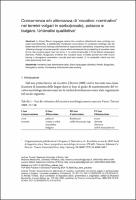Chapter Concorrenza e/o alternanza di ‘vocativo: nominativo’ nei termini volgari in serbo(croato), polacco e bulgaro. Un’analisi qualitativa
| dc.contributor.author | Trovesi, Andrea | |
| dc.date.accessioned | 2024-04-02T15:51:02Z | |
| dc.date.available | 2024-04-02T15:51:02Z | |
| dc.date.issued | 2023 | |
| dc.identifier | ONIX_20240402_9791221502169_224 | |
| dc.identifier.issn | 2612-7679 | |
| dc.identifier.uri | https://library.oapen.org/handle/20.500.12657/89255 | |
| dc.language | Italian | |
| dc.relation.ispartofseries | Biblioteca di Studi Slavistici | |
| dc.subject.classification | thema EDItEUR::C Language and Linguistics::CF Linguistics | |
| dc.subject.classification | thema EDItEUR::D Biography, Literature and Literary studies::DS Literature: history and criticism | |
| dc.subject.other | Vocative case | |
| dc.subject.other | Nominative case | |
| dc.subject.other | Slavic languages (Serbian | |
| dc.subject.other | Polish | |
| dc.subject.other | Bulgarian) | |
| dc.subject.other | Derogatory words | |
| dc.subject.other | Competing inflectional case endings | |
| dc.title | Chapter Concorrenza e/o alternanza di ‘vocativo: nominativo’ nei termini volgari in serbo(croato), polacco e bulgaro. Un’analisi qualitativa | |
| dc.type | chapter | |
| oapen.abstract.otherlanguage | In those Slavic languages where the vocative inflectional case endings are used inconsistently, a statistically increased occurrence of vocative’s endings can be observed with nouns having a diminutive or hypocoristic semantics. Assuming that is the ‘affective charge’ of some specific nouns which enhances the probability of vocative case forms, the present paper has two aims: 1. to verify empirically in three Slavic languages (Serbian, Polish, Bulgarian) whether the vocative case is better preserved with nouns having a derogatory semantics (insults and bad words), 2. to establish which are the rules governing their use. | |
| oapen.identifier.doi | 10.36253/979-12-215-0216-9.11 | |
| oapen.relation.isPublishedBy | bf65d21a-78e5-4ba2-983a-dbfa90962870 | |
| oapen.relation.isbn | 9791221502169 | |
| oapen.series.number | 54 | |
| oapen.pages | 21 | |
| oapen.place.publication | Florence |

